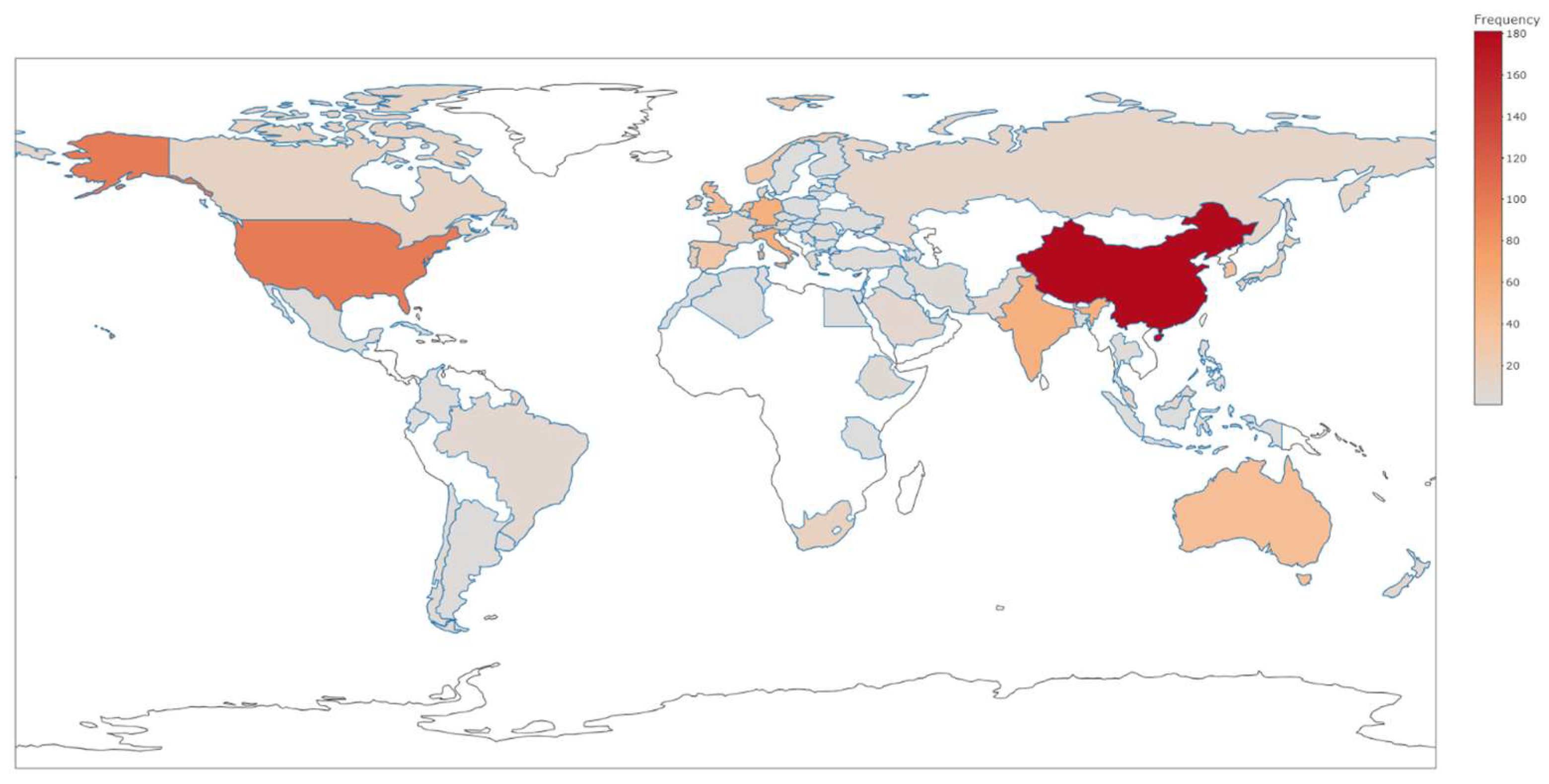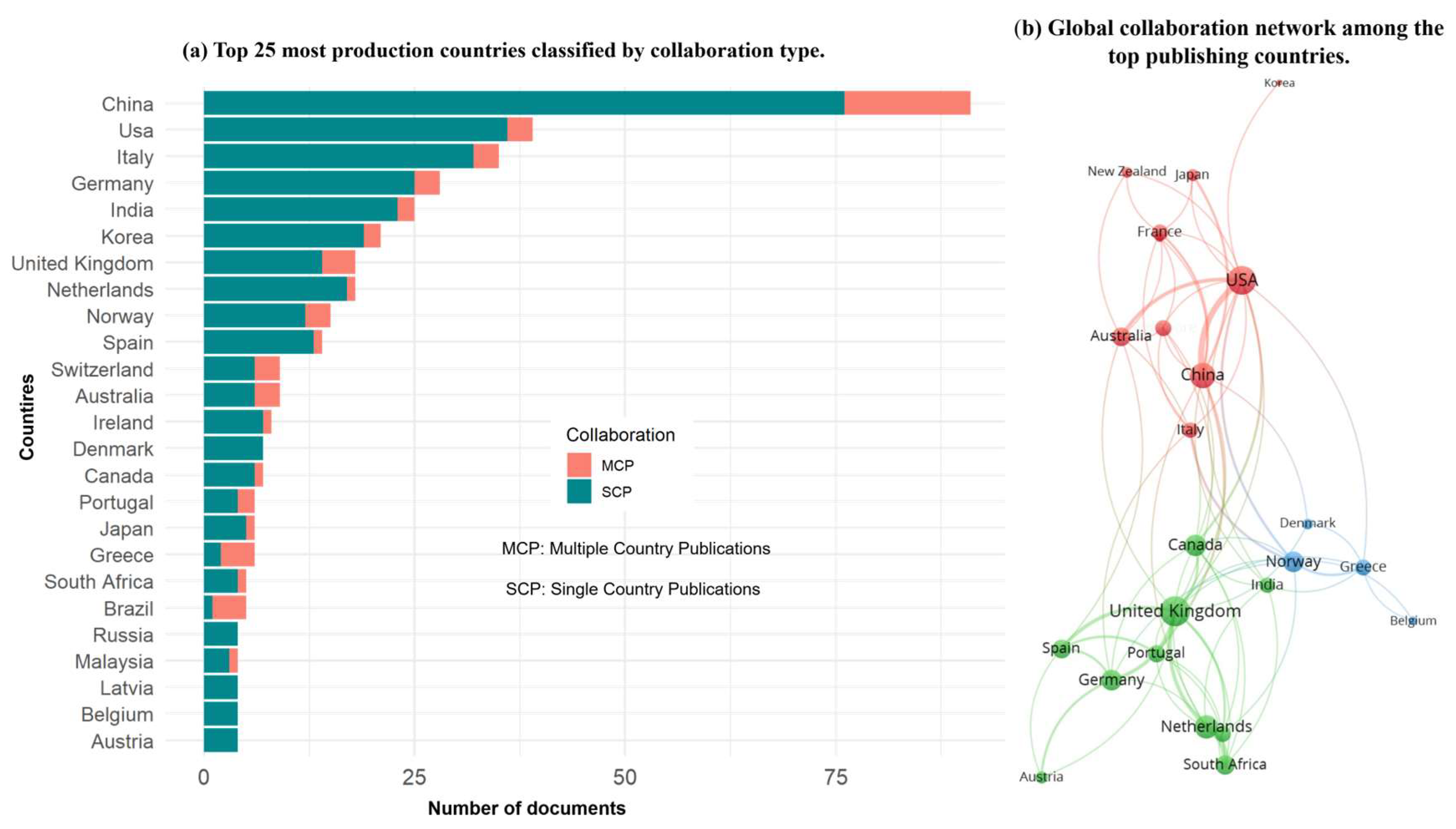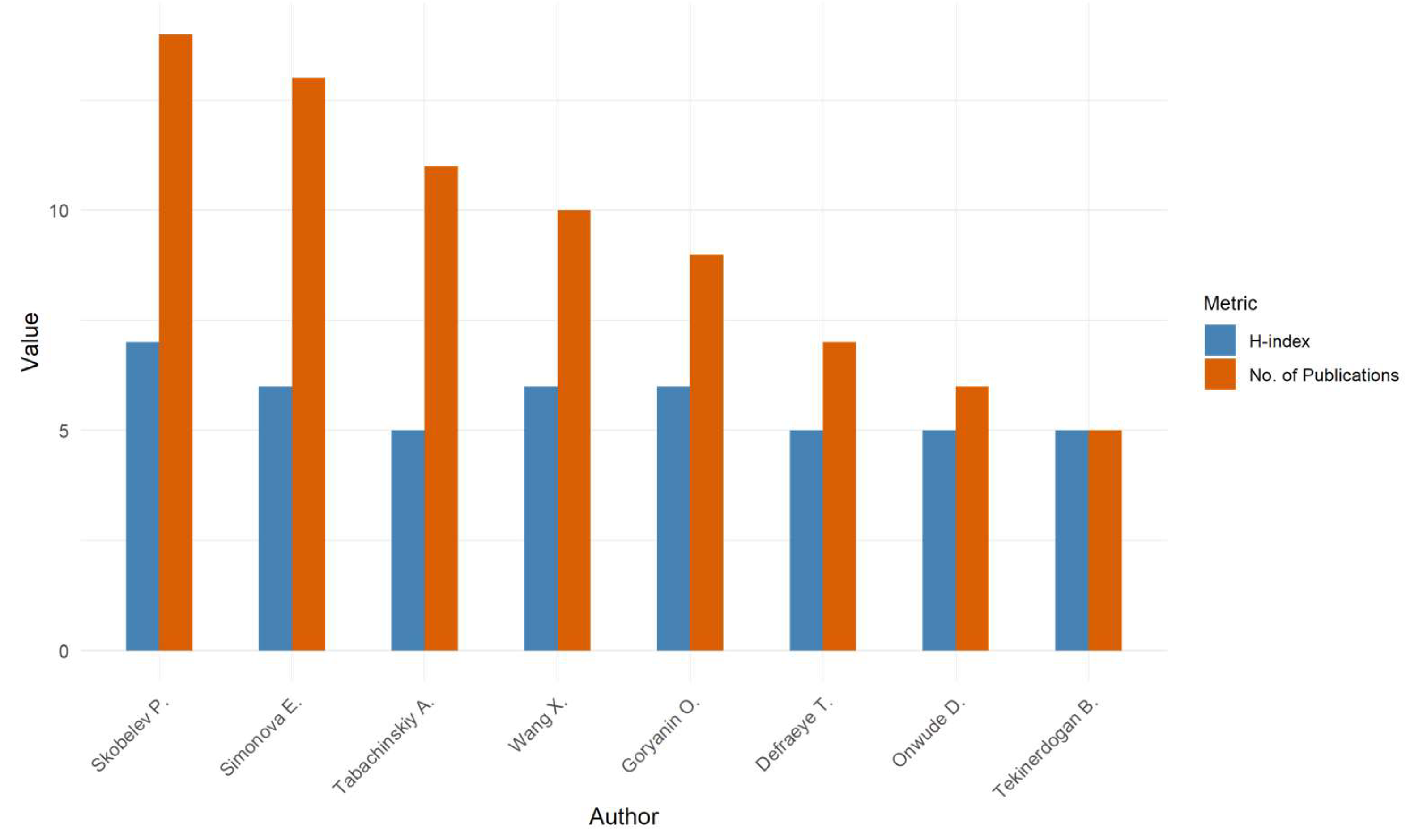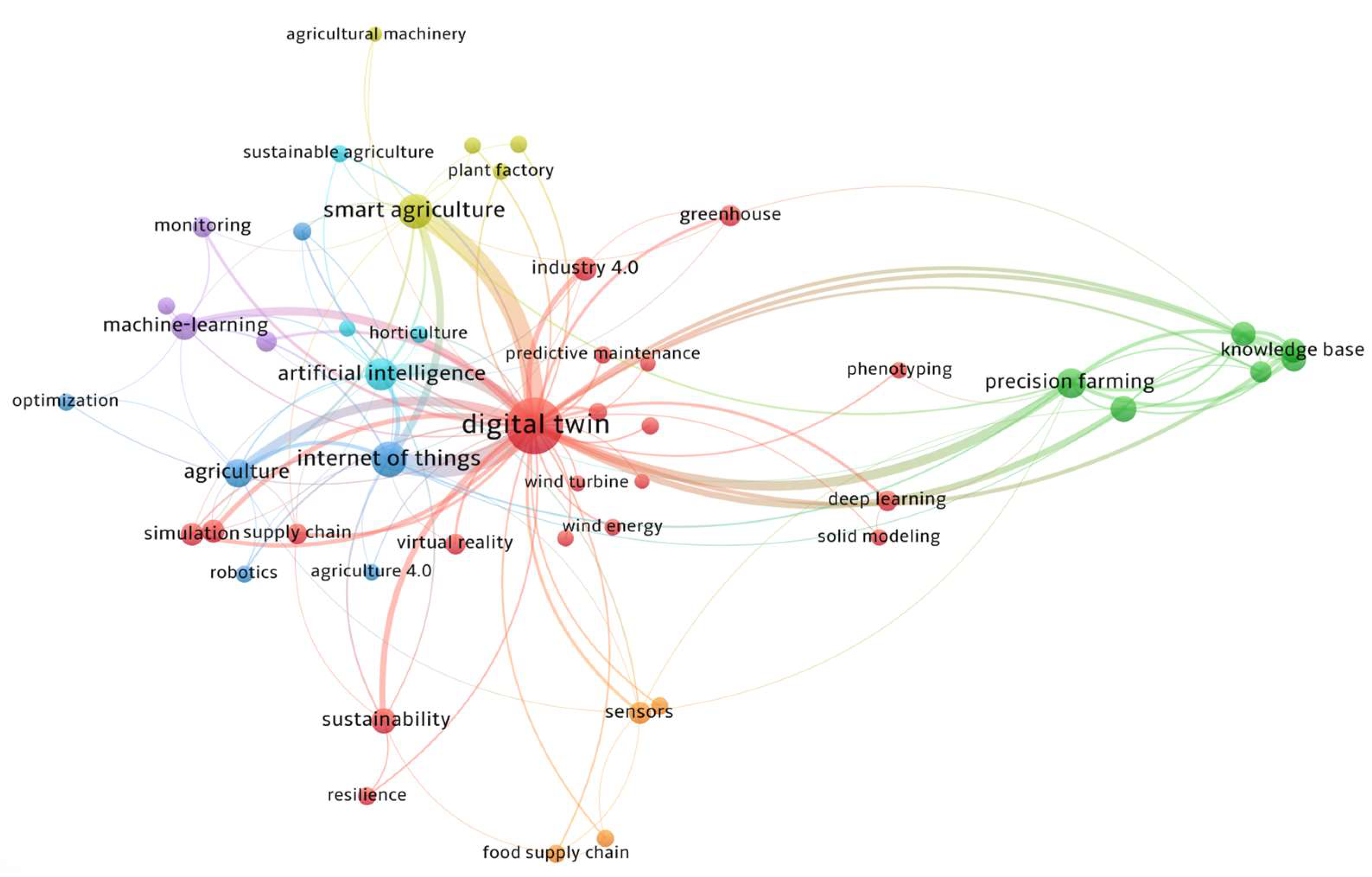Application of Digital Twin Technology in Smart Agriculture: A Bibliometric Review
Abstract
1. Introduction
2. Materials and Methods
2.1. Data Collection
2.2. Data Cleaning and Preprocessing
2.3. Bibliometric Analysis and Visualization
2.4. Data Overview
3. Results and Discussion
3.1. Publication Trends and Document Types
3.2. Global Distribution of Scientific Literature
3.3. Global Collaboration Trend and Network
3.4. Major Institutions, Authors’ Contribution, and Publishing Sources
3.5. Keyword Analysis
3.6. Keyword Trend
3.7. Keyword Co-Occurrence Network
3.8. Challenges and Future Research Directions
4. Conclusions
- The research on digital twin applications in agriculture has accelerated significantly in recent years, with an annual growth rate of 27.24%.
- Most active contributors are China, the USA, the Netherlands, Russia, and Germany, with institutions like Wageningen University and China Agricultural University leading in publication output.
- The study reveals core research areas, including precision farming, smart agriculture, IoT, machine learning, and cyber–physical systems, while identifying unexplored areas.
- The study also reveals distinct thematic clusters and shows the growing convergence between the digital twin and agricultural technologies, including remote sensing, decision support systems, and sustainability frameworks.
- The present analysis provides a quantitative and thematic understanding of the digital twin-agriculture landscape, serving as a strategic roadmap for researchers, practitioners, and policymakers.
Author Contributions
Funding
Institutional Review Board Statement
Data Availability Statement
Conflicts of Interest
References
- Fuglie, K.O.; Morgan, S.; Jelliffe, J. Economic Research Service. World Agricultural Production, Resource Use, and Productivity, 1961–2020; United States, Department of Agriculture, Economic Reserach Service: Washington, DC, USA, 2024. [Google Scholar]
- McFadden, J.; Njuki, E.; Griffin, T. Precision Agriculture in the Digital Era: Recent Adoption on US Farms; U.S. Department of Agriculture: Washington, DC, USA, 2023. [Google Scholar]
- Getahun, S.; Kefale, H.; Gelaye, Y. Application of Precision Agriculture Technologies for Sustainable Crop Production and Environmental Sustainability: A Systematic Review. Sci. World J. 2024, 2024, 2126734. [Google Scholar] [CrossRef] [PubMed]
- Anastasiou, E.; Fountas, S.; Koutsiaras, M.; Voulgaraki, M.; Vatsanidou, A.; Barreiro-Hurle, J.; Di Bartolo, F.; Gómez-Barbero, M. Precision farming technologies on crop protection: A stakeholders survey. Smart Agric. Technol. 2023, 5, 100293. [Google Scholar] [CrossRef]
- Monteiro, A.; Santos, S.; Gonçalves, P. Precision agriculture for crop and livestock farming—Brief review. Animals 2021, 11, 2345. [Google Scholar] [CrossRef]
- Navarro, E.; Costa, N.; Pereira, A. A systematic review of IoT solutions for smart farming. Sensors 2020, 20, 4231. [Google Scholar] [CrossRef]
- Soussi, A.; Zero, E.; Sacile, R.; Trinchero, D.; Fossa, M. Smart sensors and smart data for precision agriculture: A review. Sensors 2024, 24, 2647. [Google Scholar] [CrossRef] [PubMed]
- Dibbern, T.; Romani, L.A.S.; Massruhá, S.M.F.S. Main drivers and barriers to the adoption of Digital Agriculture technologies. Smart Agric. Technol. 2024, 8, 100459. [Google Scholar] [CrossRef]
- O’Donoghue, T.; Minasny, B.; McBratney, A. Digital regenerative agriculture. NPJ Sustain. Agric. 2024, 2, 5. [Google Scholar] [CrossRef]
- Purcell, W.; Neubauer, T. Digital Twins in Agriculture: A State-of-the-art review. Smart Agric. Technol. 2023, 3, 100094. [Google Scholar] [CrossRef]
- Wang, L. Digital twins in agriculture: A review of recent progress and open issues. Electronics 2024, 13, 2209. [Google Scholar] [CrossRef]
- VanDerHorn, E.; Mahadevan, S. Digital Twin: Generalization, characterization and implementation. Decis. Support Syst. 2021, 145, 113524. [Google Scholar] [CrossRef]
- Singh, M.; Fuenmayor, E.; Hinchy, E.P.; Qiao, Y.; Murray, N.; Devine, D. Digital Twin: Origin to Future. Appl. Syst. Innov. 2021, 4, 36. [Google Scholar] [CrossRef]
- Krishnan, S.; Anand, A.J.; Sendhilkumar, S. Handbook of Industrial and Business Applications with Digital Twins; CRC Press: Boca Raton, FL, USA, 2024. [Google Scholar]
- Grieves, M.W. Digital twins: Past, present, and future. In The Digital Twin; Springer: Berlin/Heidelberg, Germany, 2023; pp. 97–121. [Google Scholar]
- Shafto, M.; Conroy, M.; Doyle, R.; Glaessgen, E.; Kemp, C.; LeMoigne, J.; Wang, L. Modeling, Simulation, Information Technology and Processing Roadmap; NASA: Washington, DC, USA, 2010. [Google Scholar]
- Tao, F.; Zhang, H.; Liu, A.; Nee, A.Y. Digital twin in industry: State-of-the-art. IEEE Trans. Ind. Inform. 2018, 15, 2405–2415. [Google Scholar] [CrossRef]
- Bruynseels, K.; Santoni de Sio, F.; Van den Hoven, J. Digital twins in health care: Ethical implications of an emerging engineering paradigm. Front. Genet. 2018, 9, 31. [Google Scholar] [CrossRef] [PubMed]
- Batty, M. Digital Twins; Sage Publications: London, UK, 2018; pp. 817–820. [Google Scholar]
- Verdouw, C.; Tekinerdogan, B.; Beulens, A.; Wolfert, S. Digital twins in smart farming. Agric. Syst. 2021, 189, 103046. [Google Scholar] [CrossRef]
- Wang, J.; Li, X.; Wang, P.; Liu, Q. Bibliometric analysis of digital twin literature: A review of influencing factors and conceptual structure. Technol. Anal. Strateg. Manag. 2022, 36, 166–180. [Google Scholar] [CrossRef]
- Moreira Barreto De Oliveira, A.; Calil, Y.C.D.; Ribera, L.A.; Landivar-Bowles, J. New Insights About the Scientific Literature of Digital Twins in Agriculture: A Bibliometric Study; AAEA: New Orleans, LA, USA, 2024. [Google Scholar]
- Zhang, R.; Zhu, H.; Chang, Q.; Mao, Q. A Comprehensive Review of Digital Twins Technology in Agriculture. Agriculture 2025, 15, 903. [Google Scholar] [CrossRef]
- Zhao, Y.; Jiang, Z.; Qiao, L.; Guo, J.; Pang, S.; Lv, Z. Agricultural digital twins. Int. J. Adapt. Innov. Syst. 2022, 3, 144–156. [Google Scholar] [CrossRef]
- Bhardwaj, M.; Kumar, P.; Singh, A. Bibliometric review of digital transformation in agriculture: Innovations, trends and sustainable futures. J. Agribus. Dev. Emerg. Econ. 2025. ahead-of-print. [Google Scholar] [CrossRef]
- Goldenits, G.; Mallinger, K.; Raubitzek, S.; Neubauer, T. Current applications and potential future directions of reinforcement learning-based Digital Twins in agriculture. Smart Agric. Technol. 2024, 8, 100512. [Google Scholar] [CrossRef]
- Badgujar, C.M.; Poulose, A.; Gan, H. Agricultural object detection with You Only Look Once (YOLO) Algorithm: A bibliometric and systematic literature review. Comput. Electron. Agric. 2024, 223, 109090. [Google Scholar] [CrossRef]
- Garro, R.J.; Wilson, C.S.; Swain, D.L.; Pordomingo, A.J.; Wibowo, S. A systematic literature review on the applications of federated learning and enabling technologies for livestock management. Comput. Electron. Agric. 2025, 234, 110180. [Google Scholar] [CrossRef]
- Sahni, S.; Singh Kaurav, R.P. What? Why? When? How? Where? of Technology-Based Bibliometric Review. In Advancing Methodologies of Conducting Literature Review in Management Domain; Rana, S., Singh, J., Kathuria, S., Eds.; Emerald Publishing Limited: Leeds, UK, 2023; pp. 79–101. [Google Scholar]
- Fu, Y.; Mao, Y.; Jiang, S.; Luo, S.; Chen, X.; Xiao, W. A bibliometric analysis of systematic reviews and meta-analyses in ophthalmology. Front. Med. 2023, 10, 1135592. [Google Scholar] [CrossRef]
- Arruda, H.; Silva, E.R.; Lessa, M.; Proenca, D., Jr.; Bartholo, R. VOSviewer and Bibliometrix. J. Med. Libr. Assoc. 2022, 110, 392–395. [Google Scholar] [CrossRef]
- Sarkis-Onofre, R.; Catalá-López, F.; Aromataris, E.; Lockwood, C. How to properly use the PRISMA Statement. Syst. Rev. 2021, 10, 117. [Google Scholar] [CrossRef]
- Pranckutė, R. Web of Science (WoS) and Scopus: The Titans of Bibliographic Information in Today’s Academic World. Publications 2021, 9, 12. [Google Scholar] [CrossRef]
- Aria, M.; Cuccurullo, C. bibliometrix: An R-tool for comprehensive science mapping analysis. J. Informetr. 2017, 11, 959–975. [Google Scholar] [CrossRef]
- van Eck, N.J.; Waltman, L. Software survey: VOSviewer, a computer program for bibliometric mapping. Scientometrics 2010, 84, 523–538. [Google Scholar] [CrossRef]
- Donthu, N.; Kumar, S.; Mukherjee, D.; Pandey, N.; Lim, W.M. How to conduct a bibliometric analysis: An overview and guidelines. J. Bus. Res. 2021, 133, 285–296. [Google Scholar] [CrossRef]
- Melesse, T.Y. Digital twin-based applications in crop monitoring. Heliyon 2025, 11, e42137. [Google Scholar] [CrossRef] [PubMed]
- Shuai, C.; Wang, X. Comparative advantages and complementarity of Sino-US agricultural trade: An empirical analysis. Agric. Econ. 2011, 57, 118–131. [Google Scholar] [CrossRef]
- Zheng, Y.; Qi, J. Empirical Analysis of the Structure of Sino-US Agricultural Trade. China World Econ. 2007, 15, 35–51. [Google Scholar] [CrossRef]
- Bozeman, B.; Fay, D.; Slade, C.P. Research collaboration in universities and academic entrepreneurship: The-state-of-the-art. J. Technol. Transf. 2012, 38, 1–67. [Google Scholar] [CrossRef]
- Egghe, L. An Improvement of the H-Index: The G-Index; ISSI: Milpitas, CA, USA, 2006. [Google Scholar]
- Hirsch, J.E. An index to quantify an individual’s scientific research output. Proc. Natl. Acad. Sci. USA 2005, 102, 16569–16572. [Google Scholar] [CrossRef]
- Chang, Y.-W.; Huang, M.-H.; Lin, C.-W. Evolution of research subjects in library and information science based on keyword, bibliographical coupling, and co-citation analyses. Scientometrics 2015, 105, 2071–2087. [Google Scholar] [CrossRef]
- Wang, M.; Chai, L. Three new bibliometric indicators/approaches derived from keyword analysis. Scientometrics 2018, 116, 721–750. [Google Scholar] [CrossRef]
- Padmanandam, K.; Bheri, S.P.V.; Vegesna, L.; Sruthi, K. A speech recognized dynamic word cloud visualization for text summarization. In Proceedings of the 2021 6th International Conference on Inventive Computation Technologies (ICICT), Coimbatore, India, 20–22 January 2021; pp. 609–613. [Google Scholar]
- Lozano, S.; Calzada-Infante, L.; Adenso-Díaz, B.; García, S. Complex network analysis of keywords co-occurrence in the recent efficiency analysis literature. Scientometrics 2019, 120, 609–629. [Google Scholar] [CrossRef]
- Walter, A.; Finger, R.; Huber, R.; Buchmann, N. Opinion: Smart farming is key to developing sustainable agriculture. Proc. Natl. Acad. Sci. USA 2017, 114, 6148–6150. [Google Scholar] [CrossRef] [PubMed]
- Wolfert, S.; Ge, L.; Verdouw, C.; Bogaardt, M.-J. Big Data in Smart Farming—A review. Agric. Syst. 2017, 153, 69–80. [Google Scholar] [CrossRef]
- Rasheed, A.; San, O.; Kvamsdal, T. Digital twin: Values, challenges and enablers. arXiv 2019, arXiv:1910.01719. [Google Scholar] [CrossRef]
- Achour, Y.; Ouammi, A.; Zejli, D. Technological progresses in modern sustainable greenhouses cultivation as the path towards precision agriculture. Renew. Sustain. Energy Rev. 2021, 147, 111251. [Google Scholar] [CrossRef]
- Koukounaras, A. Advanced greenhouse horticulture: New technologies and cultivation practices. Horticulturae 2021, 7, 1. [Google Scholar] [CrossRef]
- González, J.P.; Sanchez-Londoño, D.; Barbieri, G. A Monitoring Digital Twin for Services of Controlled Environment Agriculture. IFAC-Papersonline 2022, 55, 85–90. [Google Scholar] [CrossRef]
- Mitsanis, C.; Hurst, W.; Tekinerdogan, B. A 3D functional plant modelling framework for agricultural digital twins. Comput. Electron. Agric. 2024, 218, 108733. [Google Scholar] [CrossRef]
- Sun, T.; Xiao, L.; Ata-Ul-Karim, S.T.; Ma, Y.; Zhang, W. Leveraging Phenotyping and Crop Modeling in Smart Agriculture. Front. Plant Sci. 2025, 16, 1626622. [Google Scholar] [CrossRef]
- Balta, E.C.; Tilbury, D.M.; Barton, K. A digital twin framework for performance monitoring and anomaly detection in fused deposition modeling. In Proceedings of the 2019 IEEE 15th International Conference on Automation Science and Engineering (CASE), Vancouver, BC, Canada, 22–26 August 2019; pp. 823–829. [Google Scholar]
- Attri, I.; Awasthi, L.K.; Sharma, T.P.; Rathee, P. A review of deep learning techniques used in agriculture. Ecol. Inform. 2023, 77, 102217. [Google Scholar] [CrossRef]
- Singh, R.; Seneviratne, L.; Hussain, I. A Deep Learning-Based Approach to Strawberry Grasping using a Telescopic-Link Differential Drive Mobile Robot in ROS-Gazebo for Greenhouse Digital Twin Environments. IEEE Access 2024, 13, 361–381. [Google Scholar] [CrossRef]
- Badreldin, N.; Cheng, X.; Youssef, A. An Overview of Software Sensor Applications in Biosystem Monitoring and Control. Sensors 2024, 24, 6738. [Google Scholar] [CrossRef] [PubMed]
- Subeesh, A.; Mehta, C.R. Automation and digitization of agriculture using artificial intelligence and internet of things. Artif. Intell. Agric. 2021, 5, 278–291. [Google Scholar] [CrossRef]
- Laryukhin, V.; Skobelev, P.; Lakhin, O.; Grachev, S.; Yalovenko, V.; Yalovenko, O. Towards developing a cyber-physical multi-agent system for managing precise farms with digital twins of plants. Cybern. Phys. 2019, 8, 257–261. [Google Scholar] [CrossRef]
- Li, Y.L.; Tsang, Y.P.; Wu, C.H.; Lee, C.K.M. A multi-agent digital twin–enabled decision support system for sustainable and resilient supplier management. Comput. Ind. Eng. 2024, 187, 109838. [Google Scholar] [CrossRef]
- Babar, A.Z.; Akan, O.B. Sustainable and precision agriculture with the internet of everything (IoE). arXiv 2024, arXiv:2404.06341. [Google Scholar] [CrossRef]
- Purcell, W.; Neubauer, T.; Mallinger, K. Digital Twins in agriculture: Challenges and opportunities for environmental sustainability. Curr. Opin. Environ. Sustain. 2023, 61, 101252. [Google Scholar] [CrossRef]
- Kandemir, E.; Hasan, A.; Kvamsdal, T.; Abdel-Afou Alaliyat, S. Predictive digital twin for wind energy systems: A literature review. Energy Inform. 2024, 7, 68. [Google Scholar] [CrossRef]
- Rasheed, A.; Stadtmann, F.; Fonn, E.; Tabib, M.; Tsiolakis, V.; Panjwani, B.; Johannessen, K.A.; Kvamsdal, T.; San, O.; Tande, J.O. Digital Twin for Wind Energy: Latest Updates From the NorthWind Project. In Proceedings of the International Conference on Offshore Mechanics and Arctic Engineering, Singapore, 9–14 June 2024 ; American Society of Mechanical Engineers: New York, NY, USA, 2024. [Google Scholar]
- Wang, W.; Zhou, H.; He, K.; Hopcroft, J.E. Learning latent topics from the word co-occurrence network. In Proceedings of the Theoretical Computer Science: 35th National Conference, NCTCS 2017, Wuhan, China, 14–15 October 2017; Springer: Berlin/Heidelberg, Germany, 2017; pp. 18–30. [Google Scholar]









| Category | Value |
|---|---|
| Timespan | 2018 to 2025 |
| Sources (journals, books, etc.) | 424 |
| Total number of documents | 597 |
| Document average age | 2.09 |
| Average citations per document | 8.72 |
| Keywords plus | 2910 |
| Author’s keywords | 1720 |
| Number of authors | 2244 |
| Single-authored documents | 23 |
| Co-authors per document | 4.88 |
| International co-authorship% | 12.06 |
| Institutions | Number of Articles |
|---|---|
| Wageningen University and Research, the Netherlands. | 30 |
| Norwegian University of Science and Technology, Norway. | 19 |
| Samara State Technical University, Russia. | 16 |
| China Agricultural University, China. | 15 |
| Samara National Research University, Russia. | 11 |
| University of California System, USA. | 11 |
| National University of Singapore, Singapore. | 10 |
| Stellenbosch University, South Africa. | 10 |
| Zhejiang University, China. | 9 |
| Commonwealth Scientific and Industrial Research Organization (CSIRO), Australia. | 8 |
| Sources | No. of Articles |
|---|---|
| Computers and Electronics in Agriculture | 20 |
| Sensors | 13 |
| IEEE ACCESS | 10 |
| Applied Sciences | 8 |
| Agriculture | 7 |
| Energies | 7 |
| Frontiers in Plant Science | 7 |
| “Lecture Notes in Computer Science” | 7 |
| “Digital Twins for Smart Cities and Villages” | 6 |
| “Lecture Notes in Networks and Systems” | 5 |
| Clusters | Keywords | Common Theme |
|---|---|---|
| Cluster 1 | “anomaly detection”, “data analysis”, “deep learning”, “digital agriculture”, “digital twin”, “digitalization”, “greenhouse”, “Industry 4.0”, “modeling”, “phenotyping”, “predictive maintenance”, “renewable energy”, “resilience”, “simulation”, “solid modeling”, “supply chain”, “sustainability”, “virtual reality”, “wind energy”, “wind turbine” | Key digital twin technologies and applications |
| Cluster 2 | “cyber-physical system”, “decision making”, “knowledge base”, “multi-agent system”, “ontology”, “precision farming” | Intelligent systems and decision support |
| Cluster 3 | “agriculture”, “agriculture 4.0”, “climate change”, “internet of things”, “optimization”, “robotics” | Technological convergence and environmental integration |
| Cluster 4 | “agricultural machinery”, “controlled environment”, “plant factory”, “real-time monitoring”, “smart agriculture” | Controlled environment agriculture |
| Cluster 5 | “digital transformation”, “machine-learning”, “monitoring”, “remote sensing” | Remote sensing and data-driven monitoring |
| Cluster 6 | “artificial intelligence”, “horticulture”, “sustainable agriculture”, “sustainable development” | Sustainability and policy-oriented research |
| Cluster 7 | “food industry”, “food supply chain”, “sensors”, “wind farms” | Food systems and infrastructure monitoring |
Disclaimer/Publisher’s Note: The statements, opinions and data contained in all publications are solely those of the individual author(s) and contributor(s) and not of MDPI and/or the editor(s). MDPI and/or the editor(s) disclaim responsibility for any injury to people or property resulting from any ideas, methods, instructions or products referred to in the content. |
© 2025 by the authors. Licensee MDPI, Basel, Switzerland. This article is an open access article distributed under the terms and conditions of the Creative Commons Attribution (CC BY) license (https://creativecommons.org/licenses/by/4.0/).
Share and Cite
Gund, R.; Badgujar, C.M.; Samiappan, S.; Jagadamma, S. Application of Digital Twin Technology in Smart Agriculture: A Bibliometric Review. Agriculture 2025, 15, 1799. https://doi.org/10.3390/agriculture15171799
Gund R, Badgujar CM, Samiappan S, Jagadamma S. Application of Digital Twin Technology in Smart Agriculture: A Bibliometric Review. Agriculture. 2025; 15(17):1799. https://doi.org/10.3390/agriculture15171799
Chicago/Turabian StyleGund, Rajesh, Chetan M. Badgujar, Sathishkumar Samiappan, and Sindhu Jagadamma. 2025. "Application of Digital Twin Technology in Smart Agriculture: A Bibliometric Review" Agriculture 15, no. 17: 1799. https://doi.org/10.3390/agriculture15171799
APA StyleGund, R., Badgujar, C. M., Samiappan, S., & Jagadamma, S. (2025). Application of Digital Twin Technology in Smart Agriculture: A Bibliometric Review. Agriculture, 15(17), 1799. https://doi.org/10.3390/agriculture15171799







